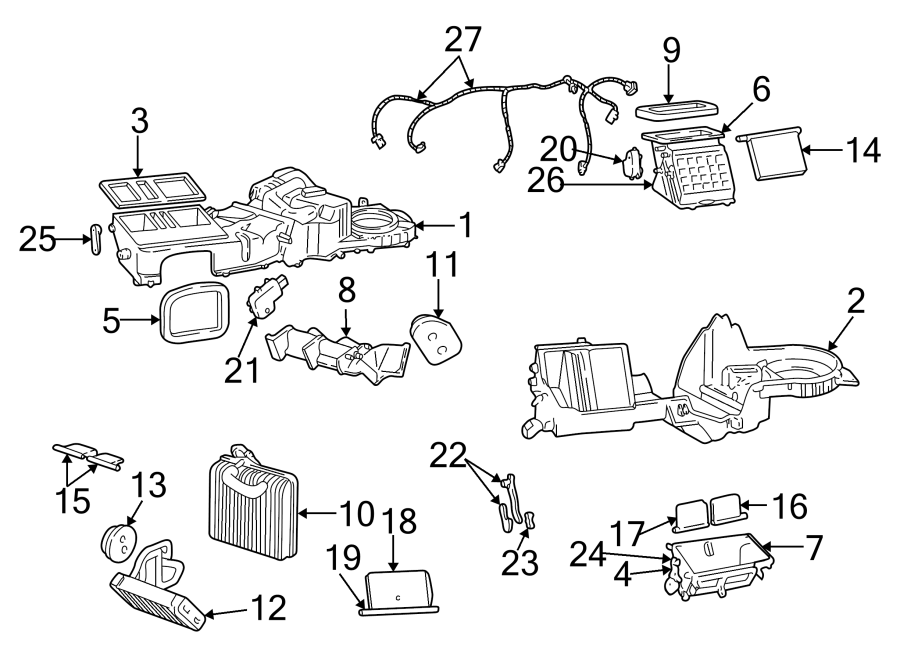When the sun blazes down, and you slide into the driver’s seat of your Jeep Grand Cherokee, what do you expect? A rush of refreshing cool air against your skin, right? Yet all too often, that experience transforms into a sweltering affair when your air conditioning system falters. The challenge is daunting—why does it sometimes seem that the AC runs hotter than the summer sun? If you’re one of the many Jeep Grand Cherokee owners grappling with this predicament, let’s navigate through the potential fixes together.
First, it’s essential to understand what makes the Jeep Grand Cherokee’s air conditioning system tick. The AC system is a delicate ensemble of several components working in unison to provide the comfort we crave. When one of these components malfunctions, the entire cooling apparatus may fail. Common issues involve the compressor, condenser, evaporator, and the blend door. Have you ever considered how a simple failure can lead to an intricate web of problems?
Recognizing the Symptoms
Detecting issues with your AC system isn’t as straightforward as you might think. Unusual noises when you activate the air conditioning can be an early warning sign. Do you hear a squealing sound? That could indicate a worn-out serpentine belt, while a hissing noise might point towards a refrigerant leak. These auditory clues serve as the foundation for diagnosing the problem before it escalates.
Another red flag is inconsistency in the temperature. Should you notice that your Jeep’s air conditioning only works sporadically, with cold air giving way to warm gusts unexpectedly, it may be time to investigate further. Let’s not forget about odors; if there’s an acrid smell when you switch on the AC, this could suggest mold or mildew lurking in the system, which not only affects comfort but could also pose health risks.
Common Jeep AC Problems
As we jump into the potential problems, the first contender for your attention is the aforementioned compressor. Acting as the heart of your AC system, if the compressor fails, the entire operation will come to a screeching halt. A visual inspection can often reveal whether it is disengaging as it should. Does it cycle on and off frequently? That could be a sign it’s on the fritz.
Next in line, consider the condenser. Often positioned at the front of the vehicle, the condenser is crucial for dissipating heat. A clogged or damaged condenser can lead to decreased cooling capacity. Have you recently experienced road debris or a minor collision? Even the smallest dent can compromise its effectiveness.
Now, let’s hone in on refrigerant levels—a frequently overlooked issue. If your air conditioning system is low on refrigerant due to a leak, it can cause the system to underperform. Keeping an eye on refrigerant levels becomes vital, as they not only affect performance but also ensure your system operates within safe parameters.
Basic Troubleshooting
Before rushing off to the mechanic, some basic troubleshooting steps can save you time and money. Start with the simplest of fixes: checking your AC settings. Is the air recirculation mode on? If not, switching it can dramatically alter the cooling experience. Ensure that all settings are configured properly; sometimes the solution can be surprisingly simple.
If the issue persists, inspect the fuses. A blown fuse can prevent your compressor from receiving power. Recognizing electrical problems could be pivotal, especially if you have modified your Jeep or added new components.
Moving on, don’t shy away from the cabin air filter. Clogged or dirty filters can stifle airflow, leading to poor air conditioning performance. A quick replacement can sometimes yield a drastic improvement in air quality and temperature.
When to Call in the Professionals
Despite your best efforts, you may find that the hiccup persists, leaving you wondering if it’s time to call in the professionals. Consider enlisting expert assistance if you detect refrigerant leaks, compressor issues, or electrical malfunctions. Technicians carry specialized equipment to diagnose intricate problems that may go under the radar in a casual inspection.
Moreover, routine maintenance recommended by the manufacturer can keep your AC system in optimal condition. Scheduled checks allow professionals to detect imperfections before they morph into costly repairs.
Maintaining a Comfortable Ride
Driving around without a functioning AC is akin to embarking on a road trip without sunscreen—unpleasant at best, damaging at worst. Keep in mind that regular maintenance plays a pivotal role in preventing issues. Periodic inspections and timely service ensure that you are always ready to confront the scorching summer sun with a reliable blast of chilled air.
In conclusion, understanding and maintaining the air conditioning system in your Jeep Grand Cherokee may save you not only discomfort during those hot months but also prevent costly repairs down the line. So the next time the heat turns up, ask yourself: not only can you fix your Jeep’s AC, but can you also ensure it runs smoothly for your next adventure? Embrace the challenge of staying cool—your Jeep will thank you!
